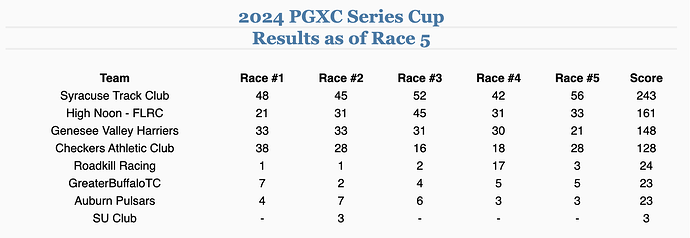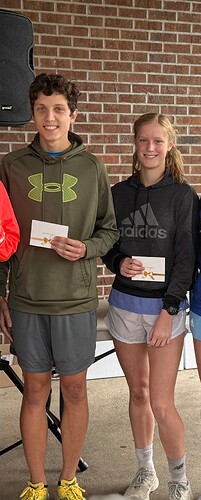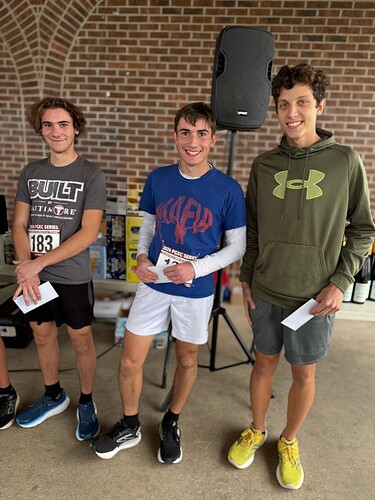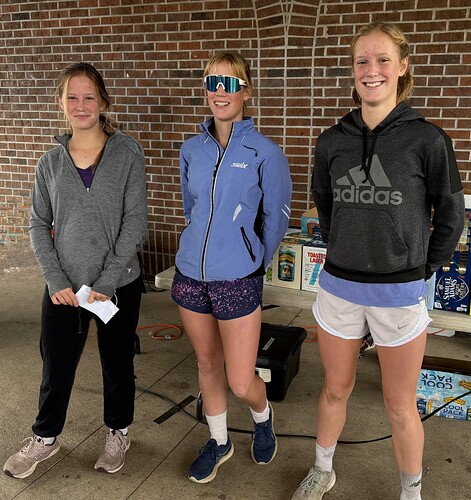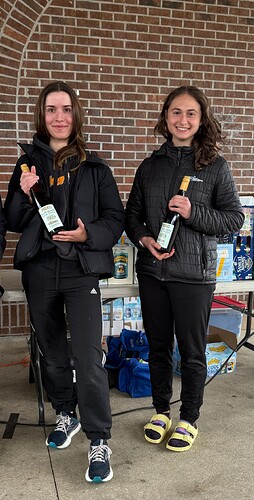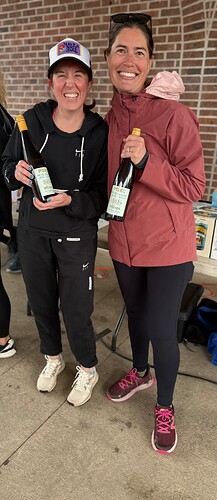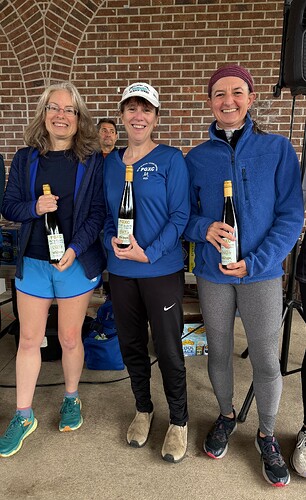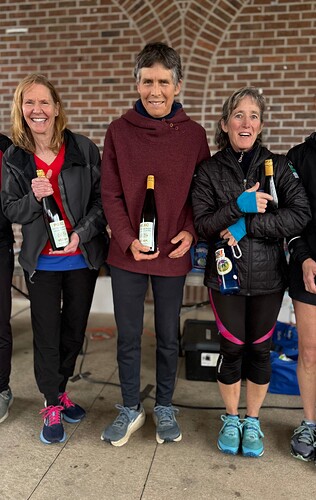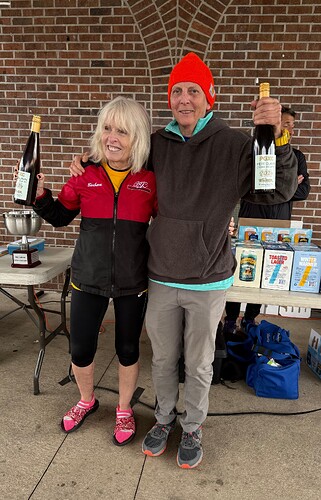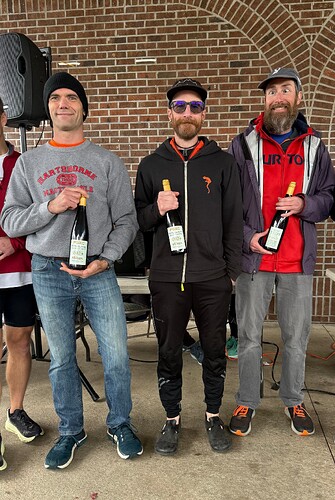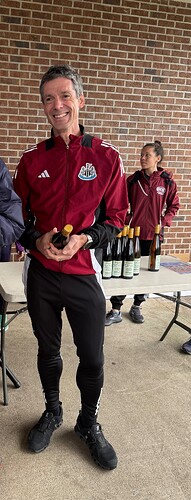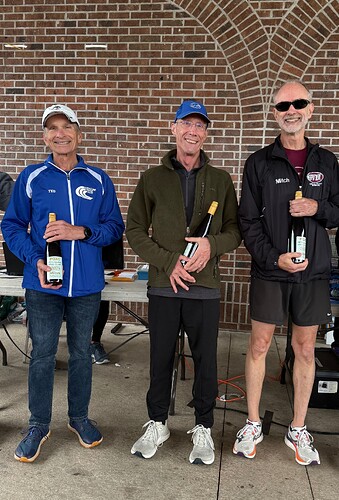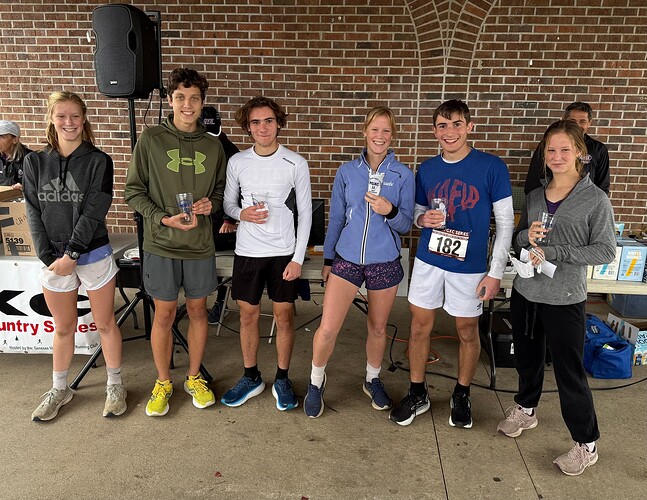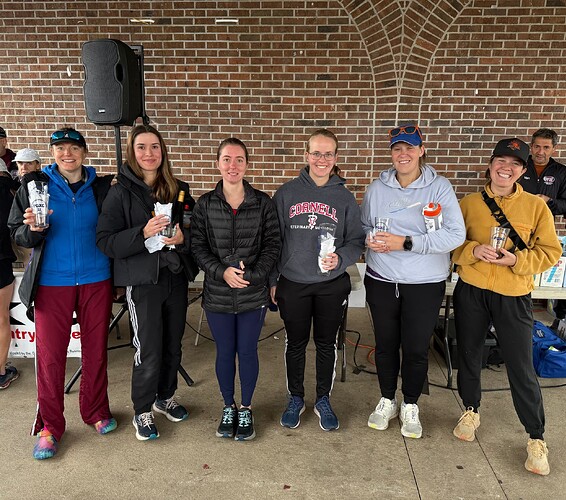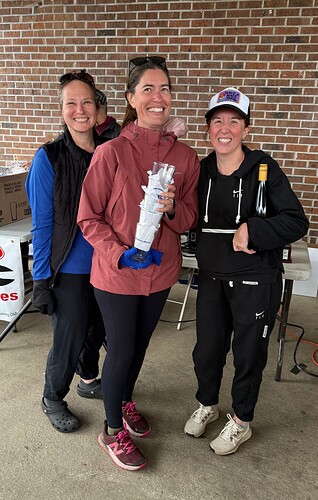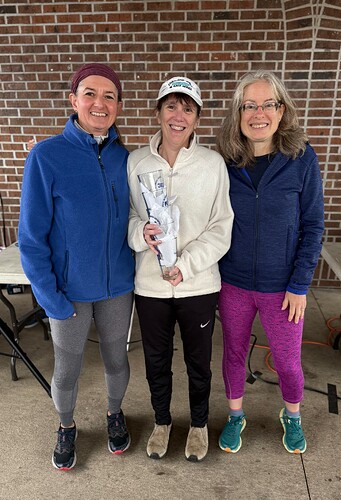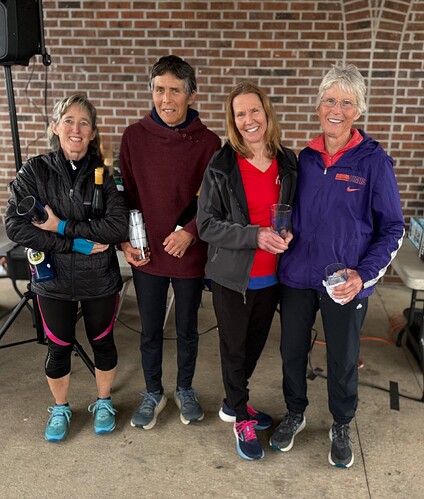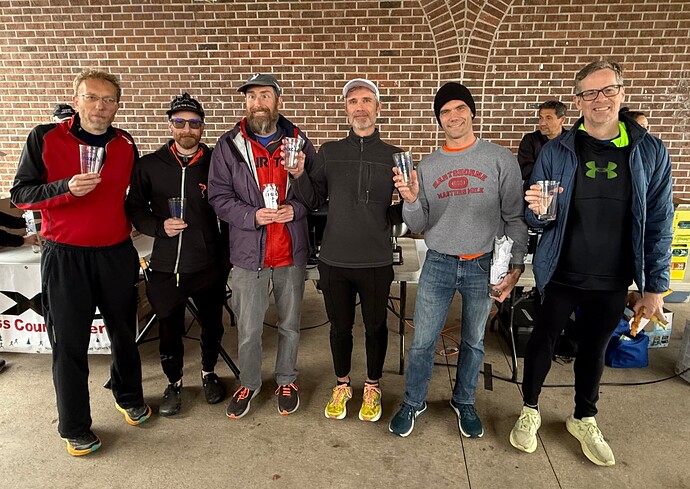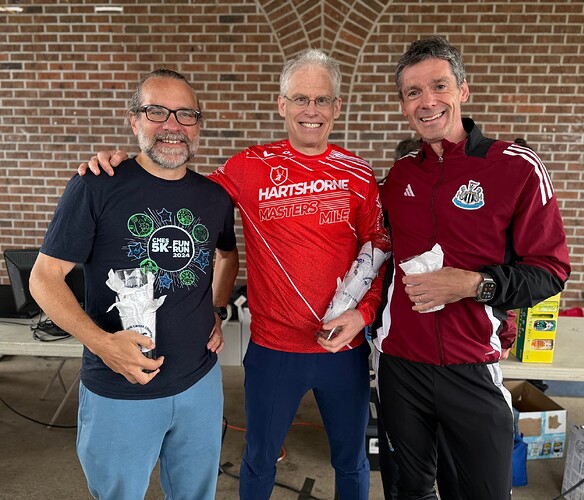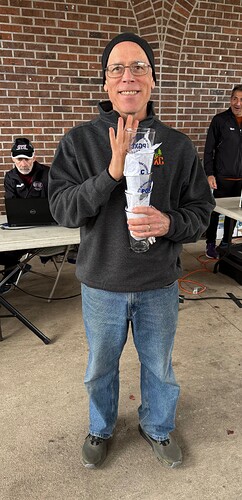Now that we’ve had our post-season PGXC party with runners and family members, it’s time to share the highlights from the final season results. (To see the series results at Run4Results, select 24 for the year, click Individual, Teams by AG, or Cup, and then click Submit.)
First, note that I write these recaps because I think it’s important to celebrate the achievements of the talented athletes in our community. It’s healthier to run with or cheer for our local stars than to focus on random celebrities. And way better than doomscrolling!
Second, I hope that sharing the enjoyment and mutual support of team running encourages more people to join our cross-country teams next year! The season may be over, but if you get in touch, we’ll make sure you’re on the @pgxc-flrc or @pgxc-high-noon groups when we start organizing parties and races next year.
Third, while Tonya and I work on the big-picture aspects of the teams, with 76 people running, it’s too much for us to do on our own. So another big thanks to this year’s PGXC age-group captains for recruiting and building community around their teams: Molly Doruska, Jessica Daily, Julie Barclay, Sandy Gregorich, Mik Kern, Tristan Lambert, Jesse Koennecke, Charlie Fay, and Carl Franck.
Club Cup
Last year, we were jazzed to place third in the overall PGXC Club Cup competition, and that was our first time out of fourth since the Club Cup inception in 2018. (The series just concluded its 35th year, but there was no overall club championship before 2018.)
This year, despite having only two teams (U19 and Women’s Vets) that won their divisions regularly, we moved up to second place! After the first two races, we were mired in fourth, but a strong third race for us and a weak race for Checkers enabled us to leapfrog out of fourth into a tie for second with the Genessee Valley Harriers. In the fourth race, we outscored GVH by 1 point. For the fifth race, I squeezed all but one possible point out of our entries on the game theory side, and the combination of that and GVH losing 6 points due to their top Super Vet woman having to drop out due to injury (so they didn’t have a full team) enabled us to exceed their score by 11 points, giving us a solid second place: 161 points to 143. (The Syracuse Track Club dominated with 243 points.)
This is a huge accomplishment given that we draw from a population base of about 100,000 compared to Buffalo’s (Checkers) 1,160,000, Rochester’s (GVH) 1,080,000, and Syracuse’s (STC) 650,000. It’s a testament to the community we’ve built since we scored most of our points on fielding teams that took second or third consistently, even when we didn’t have the fastest runners in each division.
Team Placements
From the FLRC team standpoint, we had two particularly strong groups, the FLRC U19 co-ed team and the FLRC Vets (50-59) women’s team, each of which won their category for the series. Our FLRC Super Vets women’s team also tied for first, which will require some explanation.
- FLRC U19: 1st (yay!)
- FLRC Open: 3rd (just 1 point behind Checkers)
- FLRC Masters: 2nd
- FLRC Vets: 1st (yay!)
- FLRC Super Vets: 1st (tie with GVH)
- FLRC Ultra Vets: No team this year
First off, as you’ll see below, our U19 team owes much of its success to the Hulsey family. Last year, a woman approached me at the first race and asked if she could put her twin daughters’ stuff under our tent. I said yes, but didn’t they have another team? She said no, and minutes later, Kate and Gretchen Hulsey were running for FLRC. It’s a big family (10 kids!), so this year, the 16-year-old twins were joined by their younger sisters, Charlotte (14) and Finley (12), with Caroline (8) waiting until she’s old enough to run. (Plus, Allison Hulsey (20) joined our Open team for the fourth race.) With the addition of Ryan Jacobsen, who won all three of the races he ran for the division, Cecelia Clemons, Rahmon Daily, and Rasa Warren, we were able to field two U19 teams for the third and fifth races, significantly helping our Club Cup points.
So, how did the women’s Super Vets tie for first? GVH fielded a dominant team, winning the first four races handily, and we took second in three of those four. In the last race, however, GVH’s top runner heard a snap in her foot and had to drop out of the race. Since they had fielded only three runners, they thus lost their scoring team. (Always have a backup runner if you can.)
However, the PGXC rules never anticipated that the team leading in points for the series wouldn’t run the last race, and even with no points in the final race, GVH still exceeded our point total, 24 to 21. The closest analogy is that individuals who don’t run the last race drop out of the individual standings altogether, regardless of how many points they have. However, in the “need to make a decision quickly before the award ceremony” negotiation, PGXC director Mike Nier and I agreed that GVH and FLRC would share first place this year. I strongly suspect that the rule about individuals needing to complete the final race will extend to teams next year, so I’m comfortable saying that we won the division. Cross country is about putting runners across the finish line; if you don’t do that, you don’t win.
The High Noon men’s teams improved on last year’s results when we had only two thirds and a fourth. While we had only a single chance at a team win at our home race for the Masters team—STC didn’t bring all their top runners—by fielding full teams consistently, we notched a second and three thirds. To improve on this showing next year, we’d need more of our fast guys to stay healthy and run more races.
- High Noon Open: 3rd (tie with Checkers)
- High Noon Masters: 2nd (tie with the Auburn Pulsars)
- High Noon Vets: 3rd (tie with Checkers)
- High Noon Super Vets: 3rd
- High Noon Ultra Vets: No team this year
Individual Placements
It was a good year for our younger runners, with three individual first-place awards for the series. Ryan Jacobsen won the U19 men’s division, Kate Hulsey won the U19 women’s division for the second year in a row, and Bella Burda placed first in the Open women’s division (because the overall winner couldn’t double-dip).
The PGXC series awards go 10 deep after the overall winner of each category, so FLRC and High Noon ended up taking home 23 awards, up one from last year. Note that a perfect score is 80 points. They went to:
U19
- Kate Hulsey: 1st Women’s U19 (80 points—a clean sweep!)
- Gretchen Hulsey: 2nd Women’s U19 (68 points)
- Charlotte Hulsey: 3rd Women’s U19 (48 points)
- Cecelia Clemons: 6th Women’s U19 (19 points)
- Ryan Jacobsen: 1st Men’s U19 (60 points)
- Sam Miller: 8th Men’s U19 (24 points)
Open
- Bella Burda: 2nd Women’s Open (54 points)
- Sarah Woodyear: 10th Women’s Open (24 points)
Masters
- Jessica Daily: 3rd Women’s Masters (37 points)
- Rebecca Lambert: 7th Women’s Masters (25 points)
- Jay Hubisz: 5th Men’s Masters (41 points)
- Scotie Jacbos: 9th Men’s Masters (26 points)
- Dave Kania: 10th Men’s Masters (24 points)
Vets
- Julie Barclay: 2nd Women’s Vets (65 points)
- Kim Jackson: 5th Women’s Vets (41 points)
- Tonya Engst: 6th Women’s Vets (36 points)
- Roger Moseley: 2nd Men’s Vets (59 points)
Super Vets
- Sandy Gregorich: 5th Women’s Super Vets (42 points)
- Gill Haines-Sharp: 6th Women’s Super Vets (40 points)
- Laura Helmerick: 7th Women’s Super Vets (37 points)
- Casey Carlstrom: 6th Men’s Super Vets (41 points)
Ultra Vets
- Ruth Sproul: 2nd Women’s Ultra Vets (62 points)
- Charlie Fay: 8th Men’s Ultra Vets (33 points)
Congratulations to everyone, and thanks for a great season! Here’s looking forward to more runners doing even better in 2025.
PS: Thanks to Jodi Clemons for taking photos at the last race! Here are our individual and team award winners.
